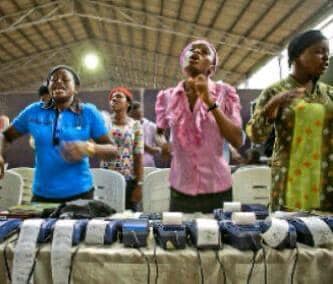There are no products in your shopping cart.
| 0 Items | £0.00 |


By Ayo Akinfe
(1) President Muhammadu Buhari has headed off to Saudi Arabia again. I sincerely hope he strikes several deals on Islamic Finance there and comes back with firm agreements to invest in our infrastructure as we currently see in Malaysia, Dubai, Indonesia, Turkey and Saudi Arabia. In all these countries, Islamic Finance is being used to fund the construction of railway networks, shopping malls, skyscrapers and hotel complexes just to mention a few things
(2) Last week, it was revealed that Pastor Bishop Oyedepo approved the spending of N650m ($1.8m) to refurbish the road that leads to his Winners Chapel mega complex
(3) In both of these cases, we have a scenario whereby faith organisations have the capacity to address Nigeria’s most pressing challenge. We have an annual budget of $28bn and a yearly infrastructural deficit of $100bn. It is clear to even the least economic literate that the government simply lacks the funds to address the issues. We desperately need capital from elsewhere
(4) In 2018, total foreign direct investment (FDI) into Nigeria only totalled $1.9bn. Although in 2017 it was $3.5bn, the sum is still minuscule compared with what is required
(5) Diaspora remittances were actually the largest source of capital in Nigeria in 2018, totalling $25bn. This however, is not targeted investment so does not create wealth, provide employment in significant numbers or boost gross domestic product (GDP) in any appreciative and impactive way
(6) So, let us do the arithmetic. From what the figures indicate, the sum total of our national budget, FDI and diaspora remittances add up to about $56bn but alas, we have an annual infrastructural deficit of $100bn. We thus have a gap of $44bn to fill and I do not see it coming from anywhere else other than religious finance
(7) Faith is a big thing in Nigeria and we simply have to tap into its economic potential. In most evangelical churches, the payment of tithes is compulsory and many of these faith houses even have POS machines in front of their pews to help with collections. If 20m Nigerians pay 10% of their earnings in what I call a Christian tax, that adds up to at least 10 times more than what the government generates in income tax, corporation tax and value added tax
(8) Aware of the role the Catholic Church played in developing Europe’s economy historically, I believe our faith houses are a readymade solution to our problem. If all of our evangelical churches combined their financial operations into a company called Man of God PLC, it would be a massive conglomerate. It could be floated on the New York and London Stock Exchanges and be operational in sectors like agribusiness, manufacturing, petrochemicals, automobile assembly, shipbuilding, railway franchising, running airlines, etc
(9) If we attracted Islamic Finance, had a conglomerate called Man of God PLC and also charged a 60% faith tax on all religious houses, we could easily raise that $44bn within two years. Churches and mosques that reduce our medical bill by going to hospitals to cure the sick, restore sight to the blind and make the disabled able, should be given tax rebates. I love religion because it is the solution to our lack of investment capital and the panacea to our plethora of socio-economies woes
(10) I fail to see anywhere else where Nigeria can raise $44bn from other than religion. It is the only thing that makes people part with cash without question. We desperately need our National Assembly to pass a Religious Finance Bill 2019 to raise the much-needed funds for infrastructural development